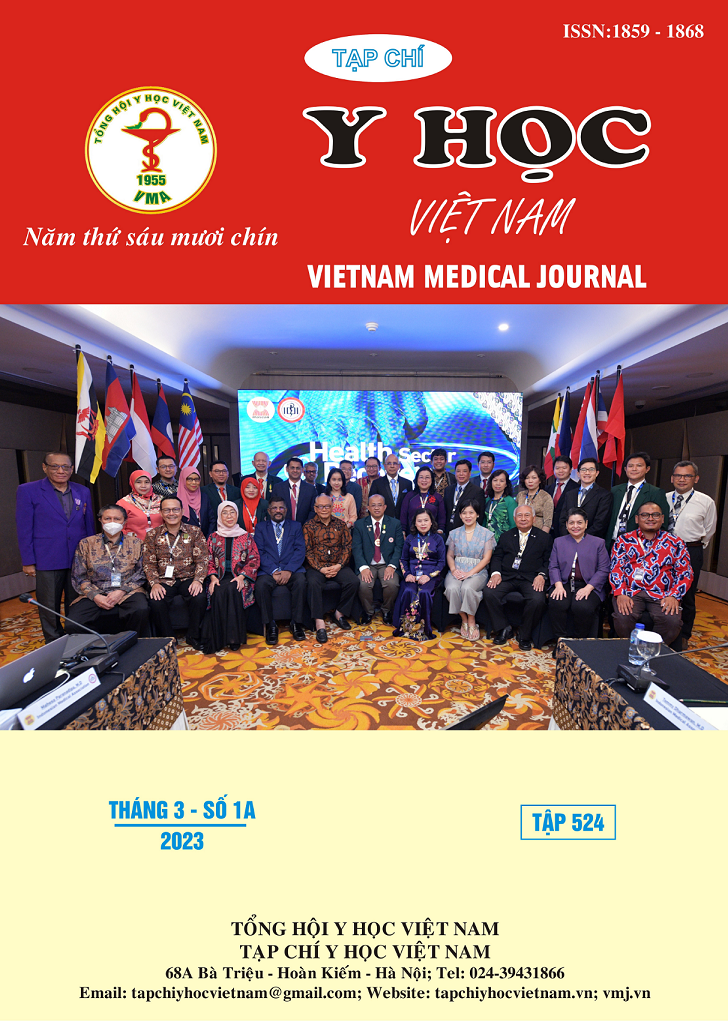BÁO CÁO HAI PHẢ HỆ HỘI CHỨNG BRUGADA CÓ ĐỘT BIẾN GEN SCN5A GÂY BỆNH
Nội dung chính của bài viết
Tóm tắt
Giới thiệu: Hội chứng Brugada (BrS) là một tình trạng rối loạn nhịp tim di truyền gây đột tử. Bệnh có tính gia đình rất rõ. Một sô đột biến trên gen SCN5A, mã hóa cho kênh natri, đã được xác định là nguyên nhân gây hội chứng Brugada. Đây là các di truyền trội trên nhiễm sắc thể thường. Nghiên cứu phả hệ là một trong những cách tiếp cận các bệnh di truyền. Mục tiêu: Mô tả hai phả hệ bệnh nhân mắc BrS có đột biến gen SCN5A gây bệnh. Đối tượng và phương pháp nghiên cứu: Bệnh nhân được chẩn đoán BrS, đã được xác định có đột biến gen SCN5A gây bệnh và người nhà bệnh nhân. Ghi nhận các đặc điểm tiền sử và lâm sàng của mọi người trong gia đình. Tình trạng đột biến gen SCN5A được xác định bằng kỹ thuật giải trình tự gen Sanger. Sử dụng các phần mềm dự đoán chức năng protein để khảo sát tính sinh bệnh của đột biến. Kết quả: Gia đình số 1 gồm bệnh nhân và 4 thành viên, lưu hành đột biến N109del (gây bệnh) ở exon 3 và đột biến R1193Q (lành tính) ở exon 20. Gia đình số 2 gồm bệnh nhân và 6 thành viên, lưu hành đột biến R659W (gây bệnh) ở exon 13.
Chi tiết bài viết
Từ khóa
Hội chứng Brugada; gen SCN5A; phả hệ
Tài liệu tham khảo
2. Hosseini S.M., Kim R., Udupa S., et al., Reappraisal of reported genes for sudden arrhythmic death: evidence-based evaluation of gene validity for Brugada syndrome. J Circulation, 2018. 138(12): p. 1195-1205.
3. Members A.T.F., Priori S.G., Blomström-Lundqvist C., et al., 2015 ESC Guidelines for the management of patients with ventricular arrhythmias and the prevention of sudden cardiac death: The Task Force for the Management of Patients with Ventricular Arrhythmias and the Prevention of Sudden Cardiac Death of the European Society of Cardiology (ESC) Endorsed by: Association for European Paediatric and Congenital Cardiology (AEPC). J Ep Europace, 2015. 17(11): p. 1601-1687.
4. Nguyễn Văn Điền L.Đ.T.v.N.Đ.H., Hội chứng Brugada nhân một gia đình. Tạp chí Tim mạch học, 2007. 47: p. 16-19.
5. Probst V., Veltmann C., Eckardt L., et al., Long-term prognosis of patients diagnosed with Brugada syndrome: results from the FINGER Brugada Syndrome Registry. J Circulation, 2010. 121(5): p. 635-643.
6. Cerrone M., Remme C.A., Tadros R., et al., Beyond the one gene–one disease paradigm: complex genetics and pleiotropy in inheritable cardiac disorders. J Circulation, 2019. 140(7): p. 595-610.
7. Gourraud J.-B., Barc J., Thollet A., et al., The Brugada syndrome: a rare arrhythmia disorder with complex inheritance. J Frontiers in cardiovascular medicine, 2016. 3: p. 9.
8. Brugada P., Brugada R., and Brugada J., Sudden death in patients and relatives with the syndrome of right bundle branch block, ST segment elevation in the precordial leads V1to V3and sudden death. J European heart journal, 2000. 21(4): p. 321-326.
9. Risgaard B., Jabbari R., Refsgaard L., et al., High prevalence of genetic variants previously associated with Brugada syndrome in new exome data. J Clinical genetics, 2013. 84(5): p. 489-495.
10. Wilde A.A. and Amin A.S., Clinical spectrum of SCN5A mutations: long QT syndrome, Brugada syndrome, and cardiomyopathy. J JACC: Clinical Electrophysiology, 2018. 4(5): p. 569-579.


